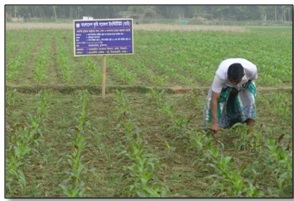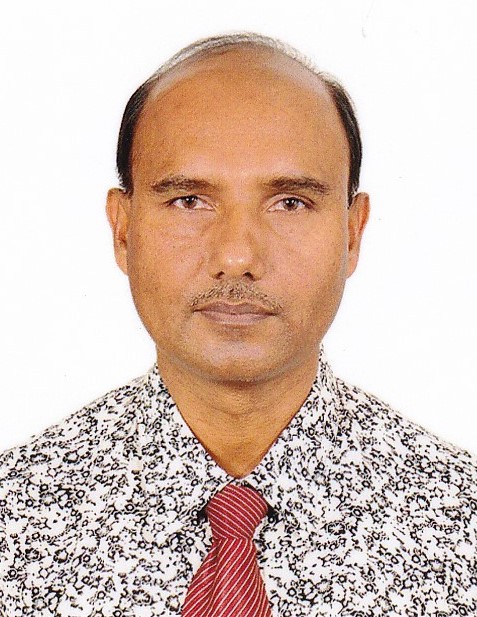পরিচিতি
Bangladesh Agriculture faces many challenges today. Major challenges are to raise productivity and profitability, reduce high production costs, increase price of products and resource-use efficiency, halt declining and degradation of soil resources and declining of animal and fisheries resources, adaptation to climate change vulnerability, providing consumers safe food, yield gap minimization, expansion of irrigation facilities & farm mechanization, production & distribution of quality seeds/varieties/ breeds/fingerlings, quality production of horticultural crop, popularization of good agricultural & IPM practices, weak linkage of farm-produces with market, low investment in agriculture and inadequate credit support to farmers. These challenges have stagnated the agricultural productivity and production. Further, nutrition outcomes and food safety have not kept pace with the progress achieved with most social and economic indicators. Thus, in order to produce more food for an ever increasing population, raw materials for agro-industries and higher income for farming communities from the decreasing resources (land, water, animal and fisheries), it is necessary to develop existing agricultural production system into a more dynamic, market oriented and sustainable commercial sector by higher productivity and profitability through efficient natural resources management, irrigation expansion, agricultural intensification and diversification, mechanization, value addition and effective market link
ages.

The average ADP budget for the developing countries is 0.6% of agricultural GDP, while existing allocations for Bangladesh are low at only about one third of it 0.22% of AGDP. Resources are needed for research on improved variety of seeds for wheat and jute, and to examine emerging consumer preferences. In this regard, research organizations such as the Bangladesh Agriculture Research Institute should be further strengthened through higher allocation to enable it in undertaking research and coordinating the related activities. Allocation of funds has to be combined with specific mechanism for fund utilization as funds remain mostly unutilized. Currently, private agricultural research is still limited and so are private advisory services. Hence, there is still a strong need for continued public support in these two domains. Similarly, the marketing chains between farmers and ultimate consumers are often times inordinately long, severely undercutting the price pass-through between the ultimate retail value and the farm-gate price. Finally, there is a strong need for public sector support in improving food safety and strengthening early warning systems in disaster prone areas.
To achieve these strategic goals, the GoB sought the support of Development Partners (IDA) to provide technical and financial support to activities aimed at boosting agricultural production through productivity enhancement, and increasing smallholders’ income. The World Bank, jointly with IFAD and USAID, decided to provide financial support to GoB for the National Agricultural Technology Program- Phase II Project (NATP-2). Thus, National Agricultural Technology Program- Phase II Project (NATP-2), a national project of the People’s Republic of Bangladesh funded by GoB/IDA/IFAD/USAID has been started its interventions through the coordinated efforts of Ministry of Agriculture (Lead Ministry) and Ministry of Fisheries and Livestock.
Components of NATP-2:
National Agricultural Technology Program-Phase II Project (NATP-2) consists of five inter-related components which address a range of constraints to technology generation, to technology transfer and adoption at farm level, and to farmers’ access to markets. The components are:
Component – 1
Enhancing Agricultural Technology Generation is being implemented by the Project Implementation Unit (PIU) of Bangladesh Agricultural Research Council ( BARC);
Component – 2
Supporting Crop Development is being implemented by the PIU of Department of Agricultural Extension (DAE);
Component – 3
Supporting Fisheries Development is being implemented by the PIU of Department of Fisheries (DOF);
Component – 4
Supporting Livestock Services is being implemented by the PIU of Department of Livestock Services (DLS) and
Component – 5
Project Management is being implemented by the Project Management Unit (PMU), NATP-2, MoA
PIU-BARC is being implemented by the Project Implementation Unit (PIU) of Bangladesh Agricultural Research Council (BARC). It will work for the implementation of Component-1(Mentioned Above). As an apex body, BARC is coordinating agricultural research with all NARS and non-NARS (Public Universities, NGOs and other organization) institutes.The Component has been supporting the need based research and development of crops, fisheries and livestock. The purpose of this component is to generate demand-led agricultural technologies (both improved varieties/breeds/fingerlings and production & post-production management packages, socio-economic, etc) in order to increase productivity and production and also to provide location and problem specific technological solutions to production problems under specific agro-ecological conditions and constrained areas.
It will contribute to achieving the PDO by helping improve the performance of the National Agricultural Research System (NARS) through supporting the development of agricultural technologies and the strengthening of agricultural research institutions.






.jpg)







